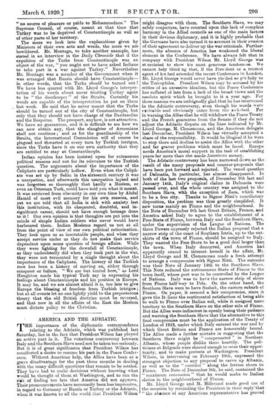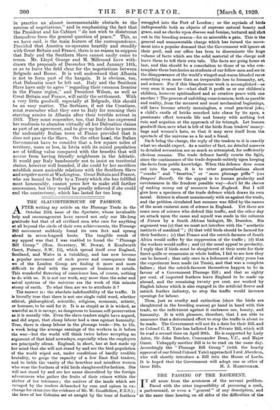AMERICA AND THE ADRIATIC. might disagree with them. The Southern
Slave, we may safely conjecture, have counted upon this lack of complete harmony in the Allied councils as one of the main factors in their devious diplomacy, and it is highly probable that the Germans have also turned it to account in their evasion of their agreement to deliver up the war criminals. Further- more, the absence of America has weakened the liberal element in the Conference. We have always felt that in company with President Wilson Mr. Lloyd George was at mutated to show his most generous tendencies. We cannot help think ng that, if the Pres dent or a trusted agent of his had attended the recent Conference in London, Mr. Lloyd George would never have yie'ded so pit fully to the Turcophiles. President Wilson may be accused by his critics of an excessive idealism, but the Peace Conference has suffered of late from a lack of the broad views and the resolute spirit which he brought to it a year ago. For these reasons we are unfeignedly glad that he has intervened in the Adriatic controversy, even though his words were excitable and obviously came from the sick-bed. For in warning the Allies that he will withdraw the Peace Treaty and the French guarantee from the Senate if they do not adjust the Adriatic dispute on the lines indicated. by Mr.
Lloyd George, M. Clemenceau, and the American delegate last, December, President Wilson has virtually aocepted a share of the responsibility. It would be illogical if he were to atop there and decline to assist the Allies with the other and far graver problems which must be faced. Europe needs America's moral support in the task of establishing peace far more than she needs American money.
The Adriatic controversy has been narrowed down as the result of the many proposals and counter-proposals that have been put forward and rejected. The vexed question of Dalmatia, In particular, has almost disappeared. In both of the last two proposals, of December 9th last and January 14th, Italy's original claims in Dalmatia were passed over, and the whole country was assigned to the Southern Slave, with the exception of Zara, which was to be a free city. Thanks to Signor Nitti's conciliatory disposition, the problem was thus greatly simplified. It now turns mainly on Fiume and the neighbourhood. In the Note of December 9th last Great Britain, France, and America asked Italy to agree to the establishment of a Free State of Fiume, between Italy and the Southern Slays, under the supervision of the League of Nations. The three Powers expressly rejected the Italian proposal that a narrow strip of the coast of Southern Istria, up to the out- skirts of the town of Fiume, should be assigned to Italy.
They wanted the Free State to be a good deal larger than the town. When Italy demurred, and America had apparently ceased to interest- herself in the affair, Mr. Lloyd George and M. Clemenceau made a fresh attempt to arrange a compromise with Signor Nitti. The outcome was their Note of January 14th to the Southern Slays. This Note reduced the autonomous State of Fiume to the town itself, whose port was to be controlled by the League of Nations. Italy was to have the narrow strip of shore from Fiume half-way to Pola. On the other hand, the Southern Slays were to have Sushak, the eastern suburb of Fiume. On paper, it seemed a fair compromise, since it gave the It .lians the sentimental satisfaction of being able to walk to Fiume over Italian soil, while it assigned more territory to the Southern Slays on the other side of Fiume. But the Allies were indiscreet in openly losing their patience and warning the Southern Slays that the alternative to this final compromise must be the application of the Treaty of London of 1915, under which Italy entered the war and by which Great Britain and France are honourably bound. The Allies made a further mistake in suggesting that the Southern Slays might be " compensated in Northern Albania, whose people dislike them heartily. The poli- ticians at Belgrade were shrewd enough to seize their oppor- tunity, and to make protests at Washington. President Wilson, in intervening on February 10th, expressed the strongest objection to any proposal to carve up Albania, as well as to the " corridor " along the Istrian shore to Fiume. The Note of December 9th, he said, contained the " maximum concession " that he would make to Italian claims in the neighbourhood of Fiume. . Mr. Lloyd George and M. Millerand made good use of the occasion by reminding. the President in their reply' that " the absence of any American representative has proved in practice an almost insurmountable obstacle to the success of negotiations," and in emphasizing the fact that the President and his Cabinet " do not wish to disinterest themselves from the general question of peace." This, as we have said, is the main feature of the correspondence. Provided that America co-operates heartily and steadily with Great Britain and France, there is no reason to suppose that Italy and the Southern Slays cannot easily come to terms. Mr. Lloyd George and M. Millerand have with- drawn the proposals of December 9th and January 14th, so as to leave the field clear for the negotiations between Belgrade and Rome. It is well understood that Albania is not to form part of the bargain. It is obvious, too, that Dalmatia must be left out. Italy and the Southern Slays have only to agree " regarding their common frontier in the Fiume region," and President Wilson, as well as Great Britain and France, will ratify the settlement. With a very little goodwill, especially at Belgrade, this should be an easy matter. The Serbians, if not the Croatians, must remember what they owe to Italy for rescuing their starving armies in Albania after their terrible retreat in 1915. They must remember, too, that Italy has expressed her readiness to abandon virtually all her Dalmatian claims as part of an agreement, and to give up her claim to possess the undeniably Italian town of Fiume provided that it does not pass to the Slays. On the other hand, the Italian Government have to consider that a few square miles of territory, more or less, in Istria with its mixed population are of trifling value compared with the benefits that will accrue from having friendly neighbours in the Adriatic. It would pay Italy handsomely not to insist on territorial claims, however well founded, if she could by her sacrifices establish more amicable relations with the Southern Slays and acquire merit at Washington. Great Britain and France, who are bound to Italy by a Treaty which she has fulfilled most honourably, cannot press her to make still further concessions, but they would be greatly relieved if she could end the controversy, which has lasted far too long.











































 Previous page
Previous page